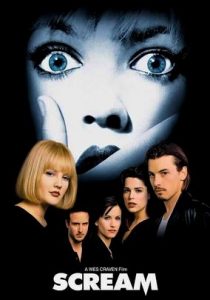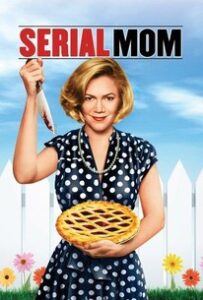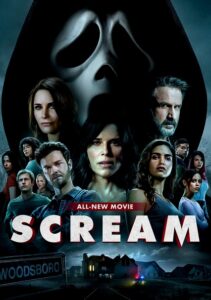Scream-1996
Director Wes Craven
Starring Drew Barrymore, Neve Campbell, David Arquette
Top 250 Films #161
Top 40 Horror Films #25
Scott’s Review #710
Reviewed January 5, 2018
Grade: A-
Wes Craven’s 1996 film Scream is a piece that greatly assisted in bringing the horror genre back into relevance after a long drought throughout the late 1980s and early 1990s when horror films suffered from both over-saturation and cliche-riddled messes.
Thanks to Scream, creativity and plot twists and turns returned to the forefront of good horror films, and a clever film was birthed.
Fast-forward to 2018, the film does suffer a bit from a dated 1990s look but is still great fun to watch and a treat for all classic horror buffs as the references to classic greats are endless.
The film is sectioned off nicely and gets underway quickly (in the best sequence of the film) as Casey Becker (Drew Barrymore) receives a flirtatious phone call while making popcorn, from a man asking her to name her favorite horror film.
The friendly game quickly turns vicious as the caller threatens to kill her boyfriend should she answer a question incorrectly.
In a clever twist (think 1960s Psycho!) Casey and her boyfriend meet deadly fates and the opening credits begin to roll.
Given the huge star, Barrymore was in 1996, this twist was all the more shocking and attention-grabbing.
The remainder of the film centers around Sidney Prescott (Neve Campbell), a popular California high school student, as she is pursued by an attacker known only as “Ghostface”, who dons a creepy costume and terrorizes victims via phone calls.
The small town, led by police officer Dewey Riley (David Arquette) and bitchy newswoman Gale Weathers (Courtney Cox), is determined to unmask the killer and figure out his or her motivations.
Sidney’s boyfriend, Billy (Skeet Ulrich), and other friends are along for the ride as a possible connected sub-plot involving Sidney’s deceased mother is introduced.
A romance between Dewey and Gale is also broached.
Scream is an enormous treat for fans of the horror genre as numerous references (and film clips!) of classics such as 1978’s Halloween abound throughout the film.
Other references to Friday the 13th, Prom Night, and A Nightmare On Elm Street appear during the film.
Writer, Kevin Williamson, a horror enthusiast, must have had a ball writing the screenplay that would become Scream.
In 1996, the mega-success of the film successfully not only jump-started the entire genre but also introduced younger fans of Scream to classics that were perhaps their parent’s generation and got them interested in the films.
Classic horror films are not only referenced during the film but also explained, mostly by the supporting character of Jamie, the nerdy kid who works at the video store and adores horror films.
A sequence in which he explains several “rules” of the horror genre is superlative, creative, and just great fun. He tells the teenagers at a party that anyone who drinks, has sex, or says “I will be right back”, is doomed to suffer a violent fate.
This clever writing makes Scream enormous fun to watch.
The climax of Scream is quite surprising in itself and the “great reveal” of the murderer (s) is also intelligent writing and quite the surprise. Several red herrings are produced along the way, casting suspicion on other characters who may or may not be the killers.
A small gripe of the writing is the motivations of the murderers- when the explanation is given for their killing spree, the reasoning is a bit convoluted and hard to fathom, but this is horror, and suspension of disbelief is always a necessity.
Scream is best remembered for giving the horror genre a good, hard kick in the seat of the pants and shaking all of the elements up a bit while preserving the core ideals of a good slasher film (suspense, a whodunit, and good solid kills).
Scream (1996) was followed by several sequels, some achieving better successes than others. In 2018 the film may not be quite as fresh as it once was, but is still a solid watch and memorable for relaunching a genre.


